
pathway
Python ETL framework for stream processing, real-time analytics, LLM pipelines, and RAG.
Stars: 59625
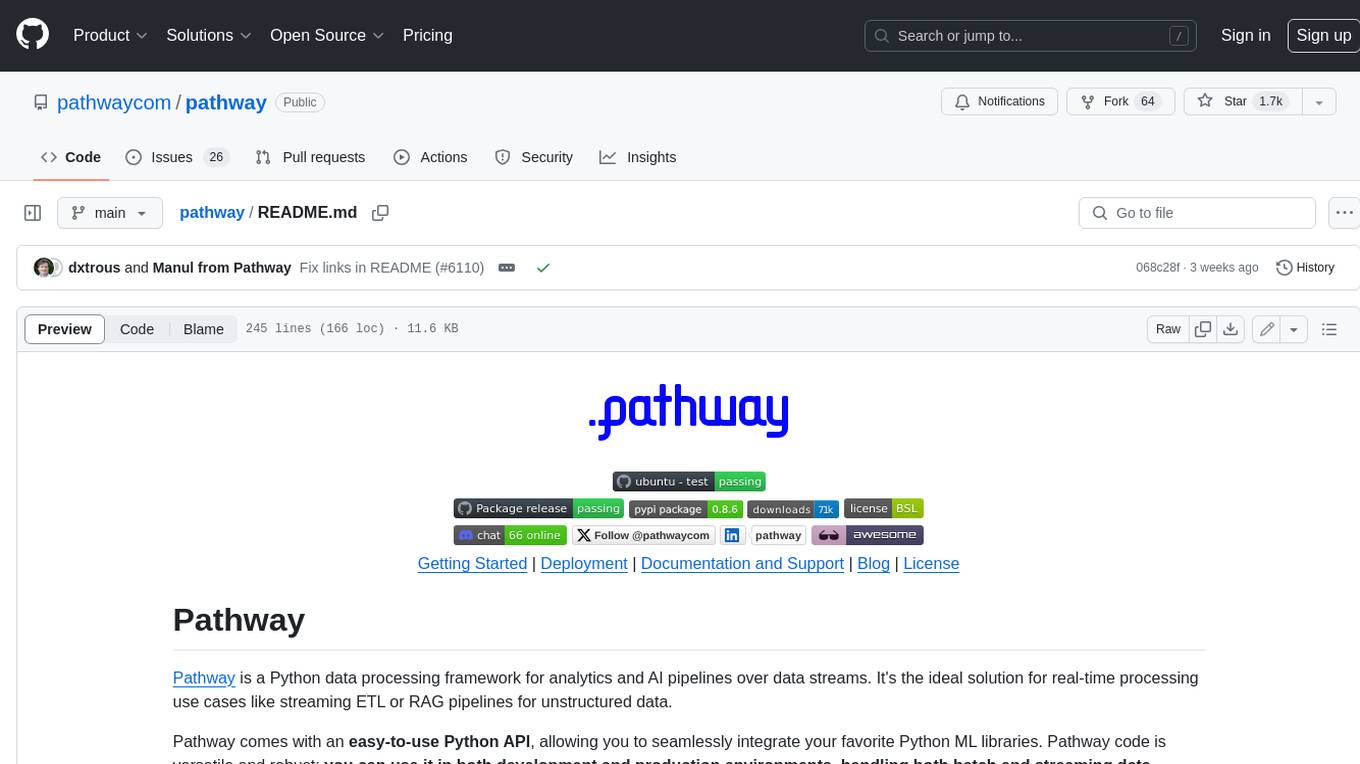
Pathway is a Python data processing framework for analytics and AI pipelines over data streams. It's the ideal solution for real-time processing use cases like streaming ETL or RAG pipelines for unstructured data. Pathway comes with an **easy-to-use Python API** , allowing you to seamlessly integrate your favorite Python ML libraries. Pathway code is versatile and robust: **you can use it in both development and production environments, handling both batch and streaming data effectively**. The same code can be used for local development, CI/CD tests, running batch jobs, handling stream replays, and processing data streams. Pathway is powered by a **scalable Rust engine** based on Differential Dataflow and performs incremental computation. Your Pathway code, despite being written in Python, is run by the Rust engine, enabling multithreading, multiprocessing, and distributed computations. All the pipeline is kept in memory and can be easily deployed with **Docker and Kubernetes**. You can install Pathway with pip: `pip install -U pathway` For any questions, you will find the community and team behind the project on Discord.
README:





Getting Started |
Deployment |
Documentation and Support |
Blog |
License
Pathway Live Data Framework
Pathway is a Python ETL framework for stream processing, real-time analytics, LLM pipelines, and RAG.
Pathway comes with an easy-to-use Python API, allowing you to seamlessly integrate your favorite Python ML libraries. Pathway code is versatile and robust: you can use it in both development and production environments, handling both batch and streaming data effectively. The same code can be used for local development, CI/CD tests, running batch jobs, handling stream replays, and processing data streams.
Pathway is powered by a scalable Rust engine based on Differential Dataflow and performs incremental computation. Your Pathway code, despite being written in Python, is run by the Rust engine, enabling multithreading, multiprocessing, and distributed computations. All the pipeline is kept in memory and can be easily deployed with Docker and Kubernetes.
You can install Pathway with pip:
pip install -U pathway
For any questions, you will find the community and team behind the project on Discord.
Ready to see what Pathway can do?
Try one of our easy-to-run examples!
Available in both notebook and docker formats, these ready-to-launch examples can be launched in just a few clicks. Pick one and start your hands-on experience with Pathway today!
With its unified engine for batch and streaming and its full Python compatibility, Pathway makes data processing as easy as possible. It's the ideal solution for a wide range of data processing pipelines, including:
- Showcase: Real-time ETL.
- Showcase: Event-driven pipelines with alerting.
- Showcase: Realtime analytics.
- Docs: Switch from batch to streaming.
Pathway provides dedicated LLM tooling to build live LLM and RAG pipelines. Wrappers for most common LLM services and utilities are included, making working with LLMs and RAGs pipelines incredibly easy. Check out our LLM xpack documentation.
Don't hesitate to try one of our runnable examples featuring LLM tooling. You can find such examples here.
- Template: Unstructured data to SQL on-the-fly.
- Template: Private RAG with Ollama and Mistral AI
- Template: Adaptive RAG
- Template: Multimodal RAG with gpt-4o
- A wide range of connectors: Pathway comes with connectors that connect to external data sources such as Kafka, GDrive, PostgreSQL, or SharePoint. Its Airbyte connector allows you to connect to more than 300 different data sources. If the connector you want is not available, you can build your own custom connector using Pathway Python connector.
- Stateless and stateful transformations: Pathway supports stateful transformations such as joins, windowing, and sorting. It provides many transformations directly implemented in Rust. In addition to the provided transformation, you can use any Python function. You can implement your own or you can use any Python library to process your data.
- Persistence: Pathway provides persistence to save the state of the computation. This allows you to restart your pipeline after an update or a crash. Your pipelines are in good hands with Pathway!
- Consistency: Pathway handles the time for you, making sure all your computations are consistent. In particular, Pathway manages late and out-of-order points by updating its results whenever new (or late, in this case) data points come into the system. The free version of Pathway gives the "at least once" consistency while the enterprise version provides the "exactly once" consistency.
- Scalable Rust engine: with Pathway Rust engine, you are free from the usual limits imposed by Python. You can easily do multithreading, multiprocessing, and distributed computations.
- LLM helpers: Pathway provides an LLM extension with all the utilities to integrate LLMs with your data pipelines (LLM wrappers, parsers, embedders, splitters), including an in-memory real-time Vector Index, and integrations with LLamaIndex and LangChain. You can quickly build and deploy RAG applications with your live documents.
Pathway requires Python 3.10 or above.
You can install the current release of Pathway using pip:
$ pip install -U pathway
import pathway as pw
# Define the schema of your data (Optional)
class InputSchema(pw.Schema):
value: int
# Connect to your data using connectors
input_table = pw.io.csv.read(
"./input/",
schema=InputSchema
)
#Define your operations on the data
filtered_table = input_table.filter(input_table.value>=0)
result_table = filtered_table.reduce(
sum_value = pw.reducers.sum(filtered_table.value)
)
# Load your results to external systems
pw.io.jsonlines.write(result_table, "output.jsonl")
# Run the computation
pw.run()Run Pathway in Google Colab.
You can find more examples here.
To use Pathway, you only need to import it:
import pathway as pwNow, you can easily create your processing pipeline, and let Pathway handle the updates. Once your pipeline is created, you can launch the computation on streaming data with a one-line command:
pw.run()You can then run your Pathway project (say, main.py) just like a normal Python script: $ python main.py.
Pathway comes with a monitoring dashboard that allows you to keep track of the number of messages sent by each connector and the latency of the system. The dashboard also includes log messages.
Alternatively, you can use the pathway'ish version:
$ pathway spawn python main.py
Pathway natively supports multithreading. To launch your application with 3 threads, you can do as follows:
$ pathway spawn --threads 3 python main.py
To jumpstart a Pathway project, you can use our cookiecutter template.
You can easily run Pathway using docker.
You can use the Pathway docker image, using a Dockerfile:
FROM pathwaycom/pathway:latest
WORKDIR /app
COPY requirements.txt ./
RUN pip install --no-cache-dir -r requirements.txt
COPY . .
CMD [ "python", "./your-script.py" ]You can then build and run the Docker image:
docker build -t my-pathway-app .
docker run -it --rm --name my-pathway-app my-pathway-appWhen dealing with single-file projects, creating a full-fledged Dockerfile
might seem unnecessary. In such scenarios, you can execute a
Python script directly using the Pathway Docker image. For example:
docker run -it --rm --name my-pathway-app -v "$PWD":/app pathwaycom/pathway:latest python my-pathway-app.pyYou can also use a standard Python image and install Pathway using pip with a Dockerfile:
FROM --platform=linux/x86_64 python:3.10
RUN pip install -U pathway
COPY ./pathway-script.py pathway-script.py
CMD ["python", "-u", "pathway-script.py"]Docker containers are ideally suited for deployment on the cloud with Kubernetes. If you want to scale your Pathway application, you may be interested in our Pathway for Enterprise. Pathway for Enterprise is specially tailored towards end-to-end data processing and real time intelligent analytics. It scales using distributed computing on the cloud and supports distributed Kubernetes deployment, with external persistence setup.
You can easily deploy Pathway using services like Render: see how to deploy Pathway in a few clicks.
If you are interested, don't hesitate to contact us to learn more.
Pathway is made to outperform state-of-the-art technologies designed for streaming and batch data processing tasks, including: Flink, Spark, and Kafka Streaming. It also makes it possible to implement a lot of algorithms/UDF's in streaming mode which are not readily supported by other streaming frameworks (especially: temporal joins, iterative graph algorithms, machine learning routines).
If you are curious, here are some benchmarks to play with.
The entire documentation of Pathway is available at pathway.com/developers/, including the API Docs.
If you have any question, don't hesitate to open an issue on GitHub, join us on Discord, or send us an email at [email protected].
We build cutting-edge data processing pipelines and co-promote solutions that push the boundaries of what's possible with Python and streaming data. Meet the people helping us shape the future of data engineering.
| Project | Description |
|---|---|
| Databento | A simpler, faster way to get market data. |
| LangChain | LangChain is the platform for agent engineering. |
| LlamaIndex | The developer-trusted framework for building context-aware AI agents. |
| MinIO | MinIO is a high-performance, S3 compatible object store, open sourced under GNU AGPLv3 license. |
| PaddleOCR | PaddleOCR is an industry-leading, production-ready OCR and document AI engine, offering end-to-end solutions from text extraction to intelligent document understanding. |
| Redpanda | Build, operate, and govern streaming and AI applications without the complexity of Kafka. |
Pathway is distributed on a BSL 1.1 License which allows for unlimited non-commercial use, as well as use of the Pathway package for most commercial purposes, free of charge. Code in this repository automatically converts to Open Source (Apache 2.0 License) after 4 years. Some public repos which are complementary to this one (examples, libraries, connectors, etc.) are licensed as Open Source, under the MIT license.
If you develop a library or connector which you would like to integrate with this repo, we suggest releasing it first as a separate repo on a MIT/Apache 2.0 license.
For all concerns regarding core Pathway functionalities, Issues are encouraged. For further information, don't hesitate to engage with Pathway's Discord community.
For Tasks:
Click tags to check more tools for each tasksFor Jobs:
Alternative AI tools for pathway
Similar Open Source Tools

pathway
Pathway is a Python data processing framework for analytics and AI pipelines over data streams. It's the ideal solution for real-time processing use cases like streaming ETL or RAG pipelines for unstructured data. Pathway comes with an **easy-to-use Python API** , allowing you to seamlessly integrate your favorite Python ML libraries. Pathway code is versatile and robust: **you can use it in both development and production environments, handling both batch and streaming data effectively**. The same code can be used for local development, CI/CD tests, running batch jobs, handling stream replays, and processing data streams. Pathway is powered by a **scalable Rust engine** based on Differential Dataflow and performs incremental computation. Your Pathway code, despite being written in Python, is run by the Rust engine, enabling multithreading, multiprocessing, and distributed computations. All the pipeline is kept in memory and can be easily deployed with **Docker and Kubernetes**. You can install Pathway with pip: `pip install -U pathway` For any questions, you will find the community and team behind the project on Discord.
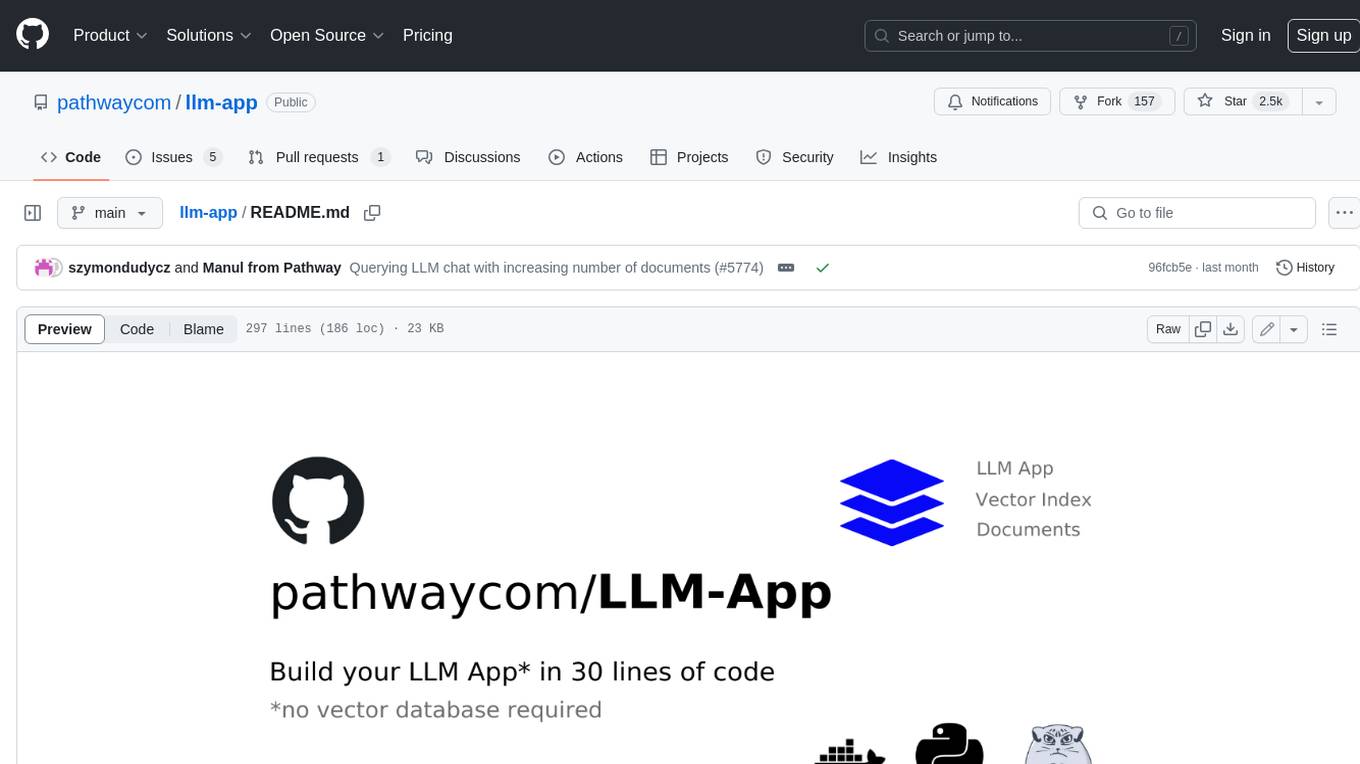
llm-app
Pathway's LLM (Large Language Model) Apps provide a platform to quickly deploy AI applications using the latest knowledge from data sources. The Python application examples in this repository are Docker-ready, exposing an HTTP API to the frontend. These apps utilize the Pathway framework for data synchronization, API serving, and low-latency data processing without the need for additional infrastructure dependencies. They connect to document data sources like S3, Google Drive, and Sharepoint, offering features like real-time data syncing, easy alert setup, scalability, monitoring, security, and unification of application logic.

morphik-core
Morphik is an AI-native toolset designed to help developers integrate context into their AI applications by providing tools to store, represent, and search unstructured data. It offers features such as multimodal search, fast metadata extraction, and integrations with existing tools. Morphik aims to address the challenges of traditional AI approaches that struggle with visually rich documents and provide a more comprehensive solution for understanding and processing complex data.
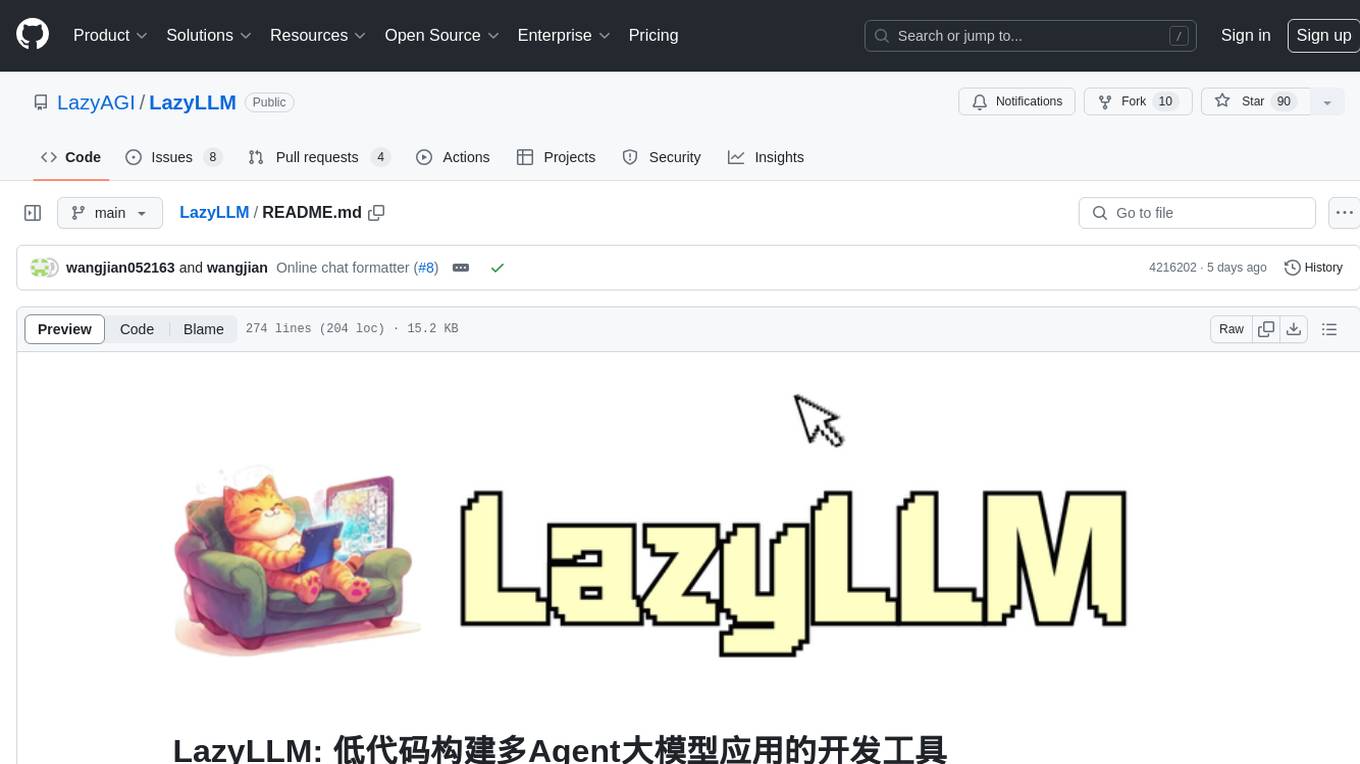
LazyLLM
LazyLLM is a low-code development tool for building complex AI applications with multiple agents. It assists developers in building AI applications at a low cost and continuously optimizing their performance. The tool provides a convenient workflow for application development and offers standard processes and tools for various stages of application development. Users can quickly prototype applications with LazyLLM, analyze bad cases with scenario task data, and iteratively optimize key components to enhance the overall application performance. LazyLLM aims to simplify the AI application development process and provide flexibility for both beginners and experts to create high-quality applications.
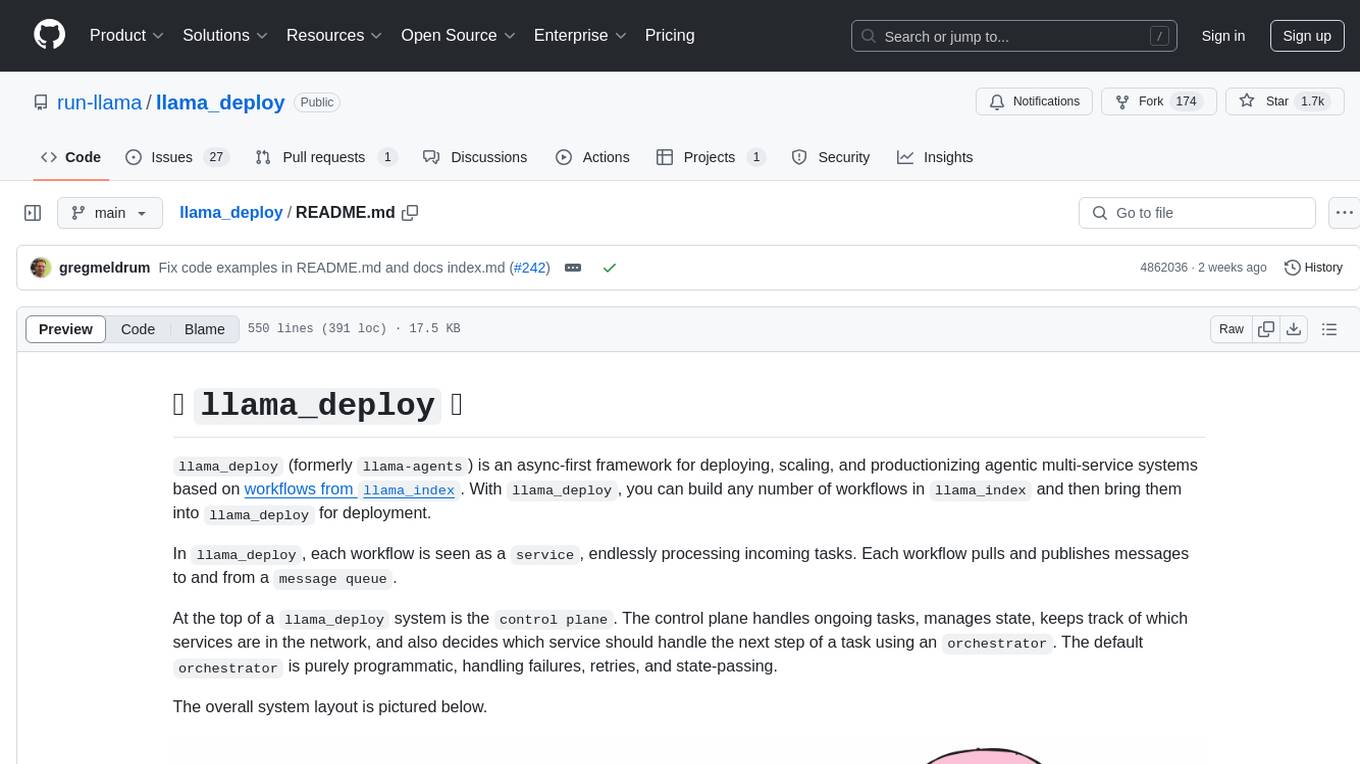
llama_deploy
llama_deploy is an async-first framework for deploying, scaling, and productionizing agentic multi-service systems based on workflows from llama_index. It allows building workflows in llama_index and deploying them seamlessly with minimal changes to code. The system includes services endlessly processing tasks, a control plane managing state and services, an orchestrator deciding task handling, and fault tolerance mechanisms. It is designed for high-concurrency scenarios, enabling real-time and high-throughput applications.
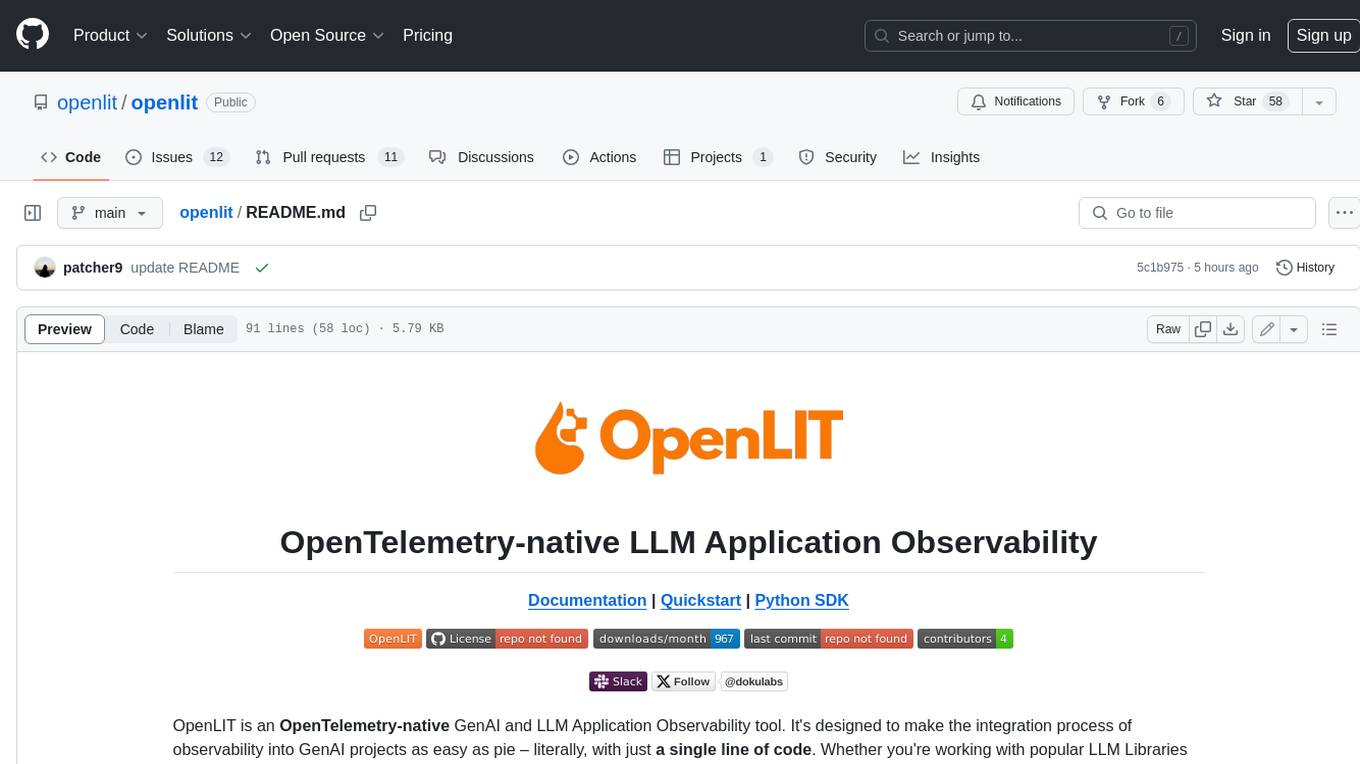
doku
OpenLIT is an OpenTelemetry-native GenAI and LLM Application Observability tool. It's designed to make the integration process of observability into GenAI projects as easy as pie – literally, with just a single line of code. Whether you're working with popular LLM Libraries such as OpenAI and HuggingFace or leveraging vector databases like ChromaDB, OpenLIT ensures your applications are monitored seamlessly, providing critical insights to improve performance and reliability.
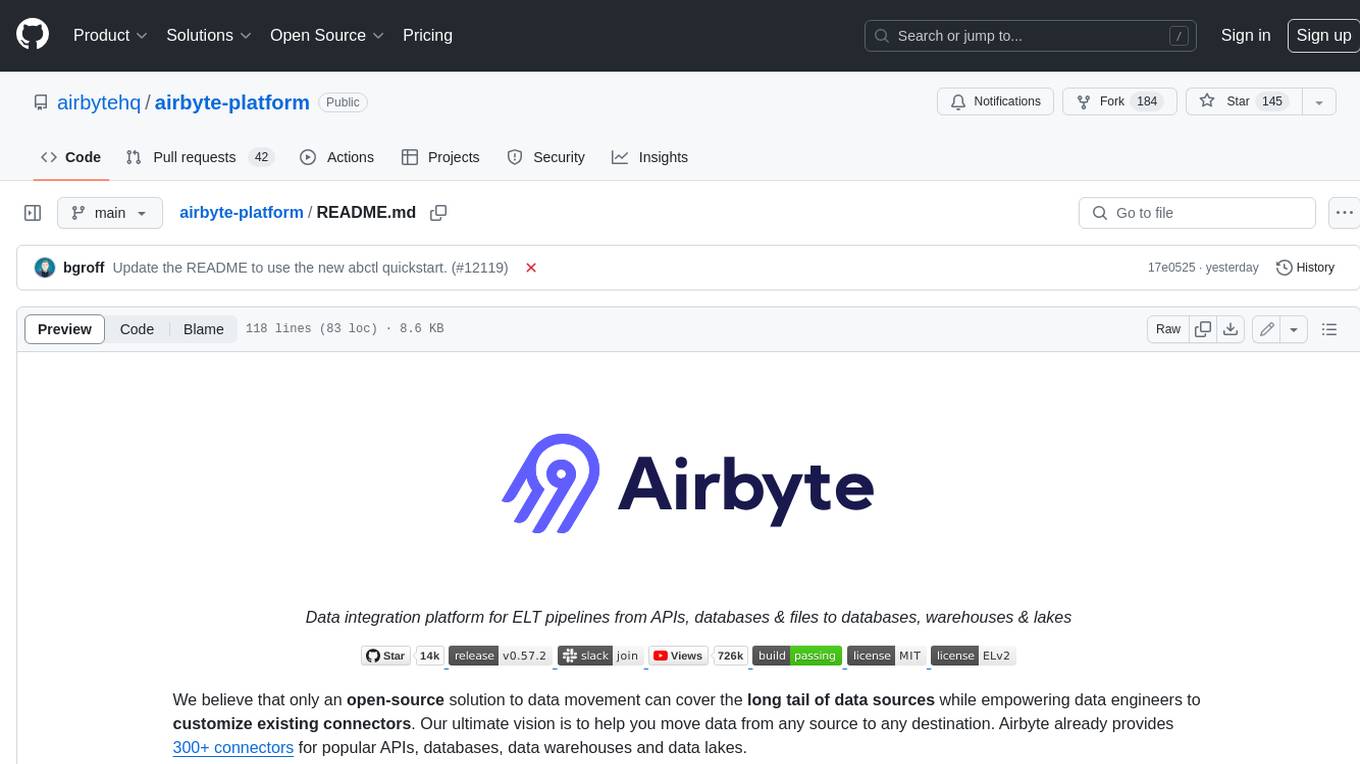
airbyte-platform
Airbyte is an open-source data integration platform that makes it easy to move data from any source to any destination. With Airbyte, you can build and manage data pipelines without writing any code. Airbyte provides a library of pre-built connectors that make it easy to connect to popular data sources and destinations. You can also create your own connectors using Airbyte's low-code Connector Development Kit (CDK). Airbyte is used by data engineers and analysts at companies of all sizes to move data for a variety of purposes, including data warehousing, data analysis, and machine learning.
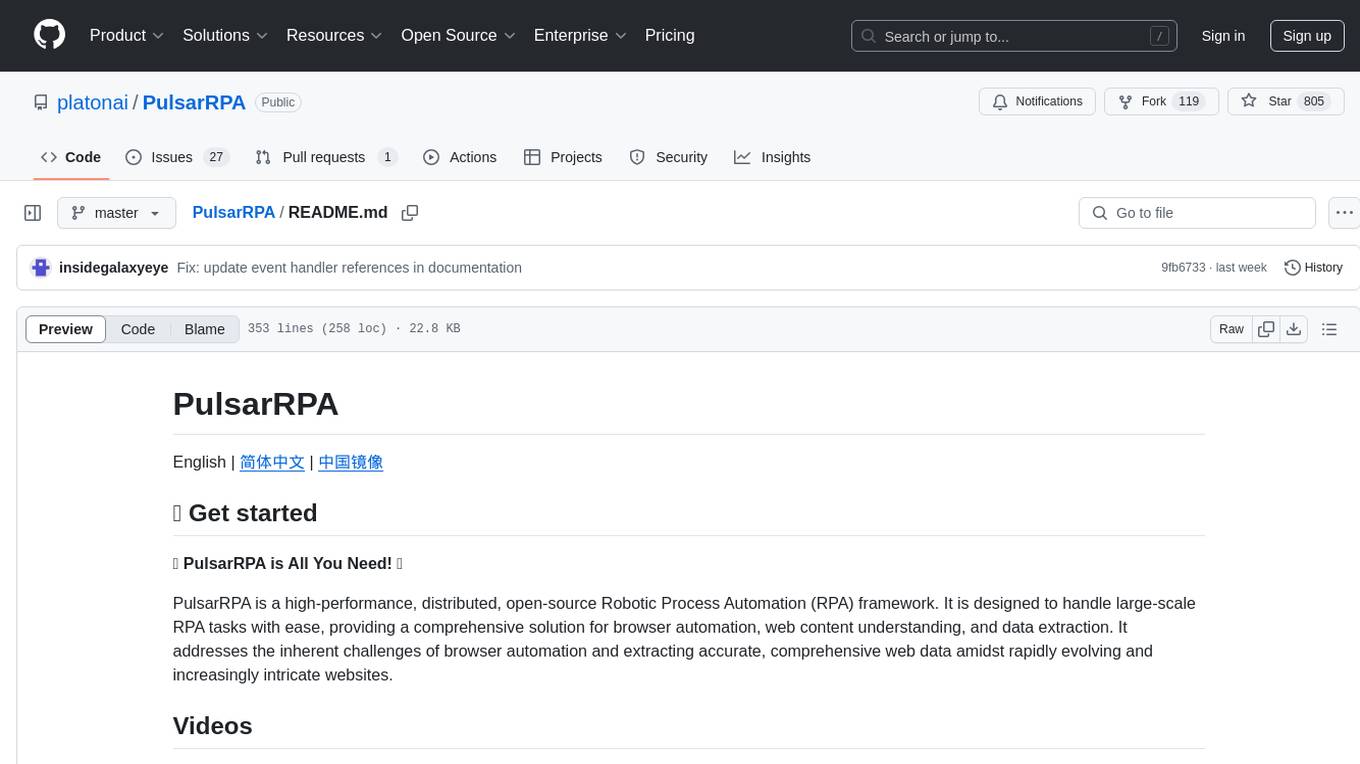
PulsarRPA
PulsarRPA is a high-performance, distributed, open-source Robotic Process Automation (RPA) framework designed to handle large-scale RPA tasks with ease. It provides a comprehensive solution for browser automation, web content understanding, and data extraction. PulsarRPA addresses challenges of browser automation and accurate web data extraction from complex and evolving websites. It incorporates innovative technologies like browser rendering, RPA, intelligent scraping, advanced DOM parsing, and distributed architecture to ensure efficient, accurate, and scalable web data extraction. The tool is open-source, customizable, and supports cutting-edge information extraction technology, making it a preferred solution for large-scale web data extraction.

Revornix
Revornix is an information management tool designed for the AI era. It allows users to conveniently integrate all visible information and generates comprehensive reports at specific times. The tool offers cross-platform availability, all-in-one content aggregation, document transformation & vectorized storage, native multi-tenancy, localization & open-source features, smart assistant & built-in MCP, seamless LLM integration, and multilingual & responsive experience for users.
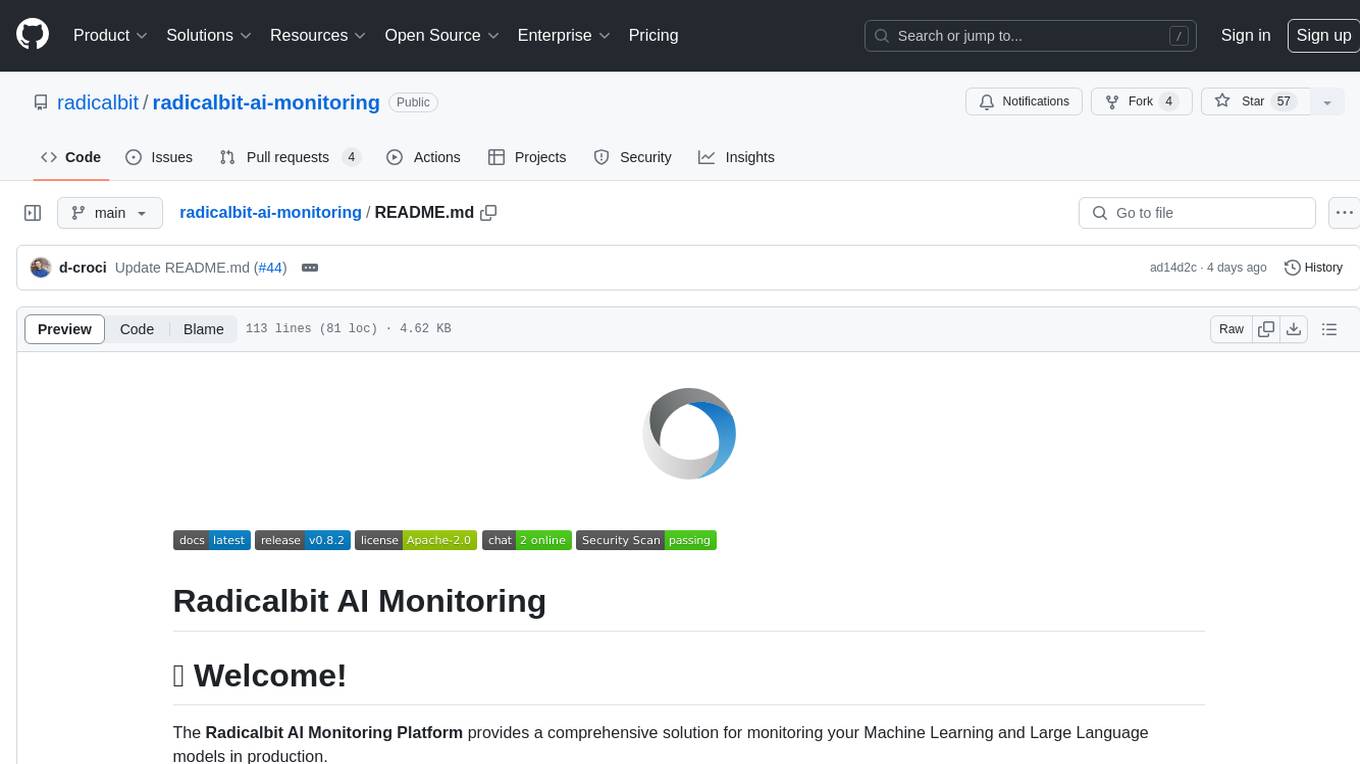
radicalbit-ai-monitoring
The Radicalbit AI Monitoring Platform provides a comprehensive solution for monitoring Machine Learning and Large Language models in production. It helps proactively identify and address potential performance issues by analyzing data quality, model quality, and model drift. The repository contains files and projects for running the platform, including UI, API, SDK, and Spark components. Installation using Docker compose is provided, allowing deployment with a K3s cluster and interaction with a k9s container. The platform documentation includes a step-by-step guide for installation and creating dashboards. Community engagement is encouraged through a Discord server. The roadmap includes adding functionalities for batch and real-time workloads, covering various model types and tasks.
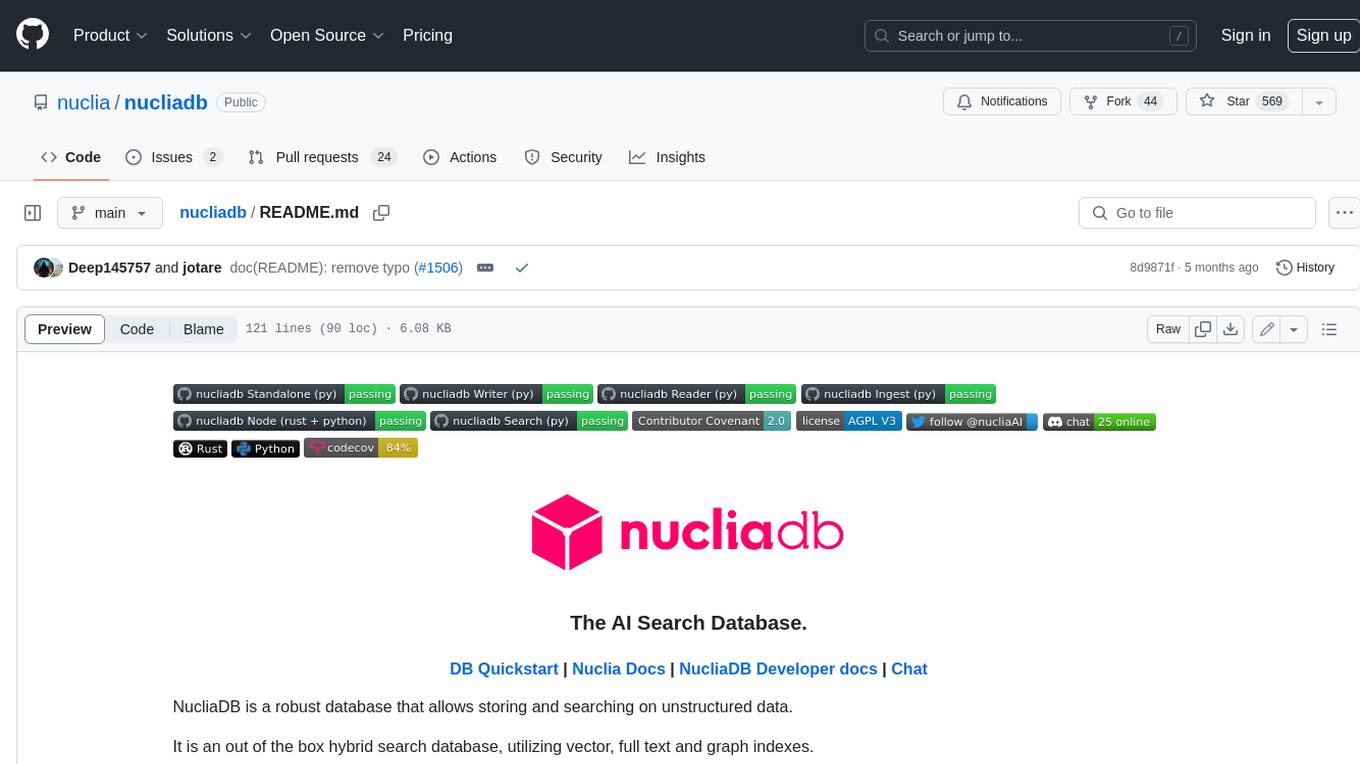
nucliadb
NucliaDB is a robust database that allows storing and searching on unstructured data. It is an out of the box hybrid search database, utilizing vector, full text and graph indexes. NucliaDB is written in Rust and Python. We designed it to index large datasets and provide multi-teanant support. When utilizing NucliaDB with Nuclia cloud, you are able to the power of an NLP database without the hassle of data extraction, enrichment and inference. We do all the hard work for you.

project_alice
Alice is an agentic workflow framework that integrates task execution and intelligent chat capabilities. It provides a flexible environment for creating, managing, and deploying AI agents for various purposes, leveraging a microservices architecture with MongoDB for data persistence. The framework consists of components like APIs, agents, tasks, and chats that interact to produce outputs through files, messages, task results, and URL references. Users can create, test, and deploy agentic solutions in a human-language framework, making it easy to engage with by both users and agents. The tool offers an open-source option, user management, flexible model deployment, and programmatic access to tasks and chats.
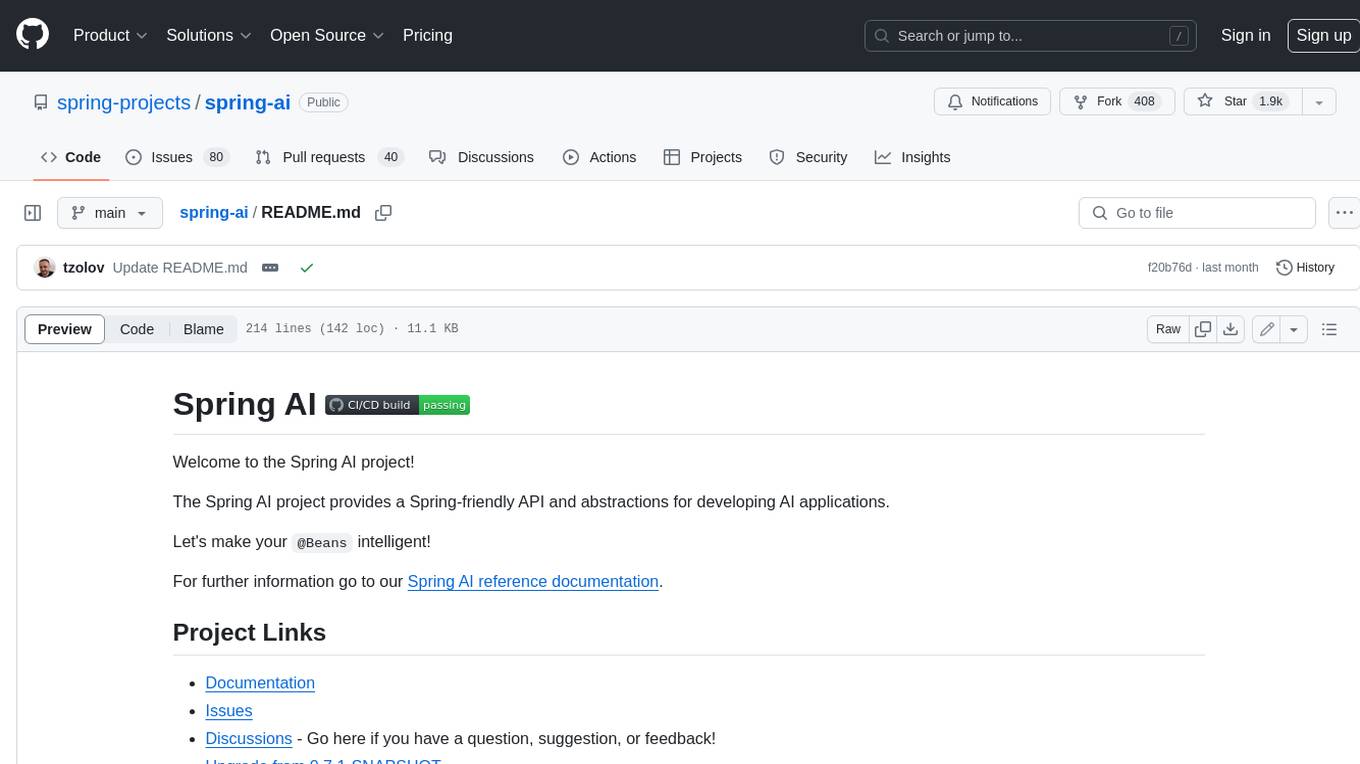
spring-ai
The Spring AI project provides a Spring-friendly API and abstractions for developing AI applications. It offers a portable client API for interacting with generative AI models, enabling developers to easily swap out implementations and access various models like OpenAI, Azure OpenAI, and HuggingFace. Spring AI also supports prompt engineering, providing classes and interfaces for creating and parsing prompts, as well as incorporating proprietary data into generative AI without retraining the model. This is achieved through Retrieval Augmented Generation (RAG), which involves extracting, transforming, and loading data into a vector database for use by AI models. Spring AI's VectorStore abstraction allows for seamless transitions between different vector database implementations.
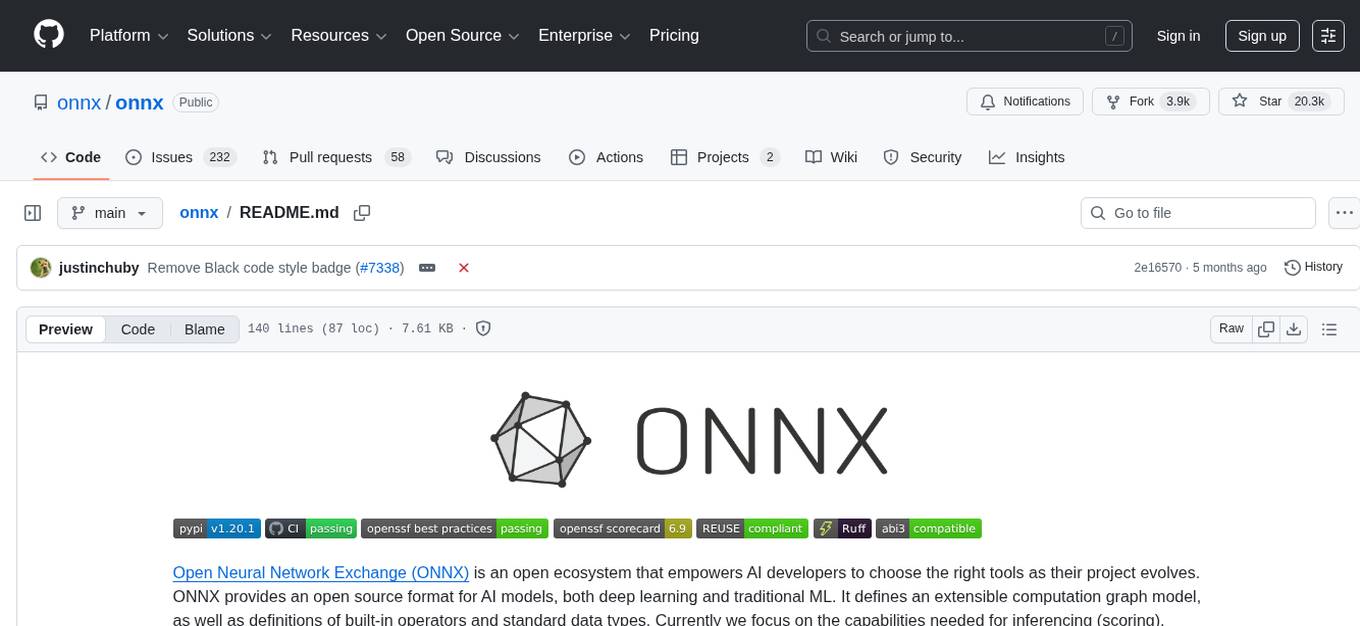
onnx
Open Neural Network Exchange (ONNX) is an open ecosystem that empowers AI developers to choose the right tools as their project evolves. ONNX provides an open source format for AI models, both deep learning and traditional ML. It defines an extensible computation graph model, as well as definitions of built-in operators and standard data types. Currently, we focus on the capabilities needed for inferencing (scoring). ONNX is widely supported and can be found in many frameworks, tools, and hardware, enabling interoperability between different frameworks and streamlining the path from research to production to increase the speed of innovation in the AI community. Join us to further evolve ONNX.
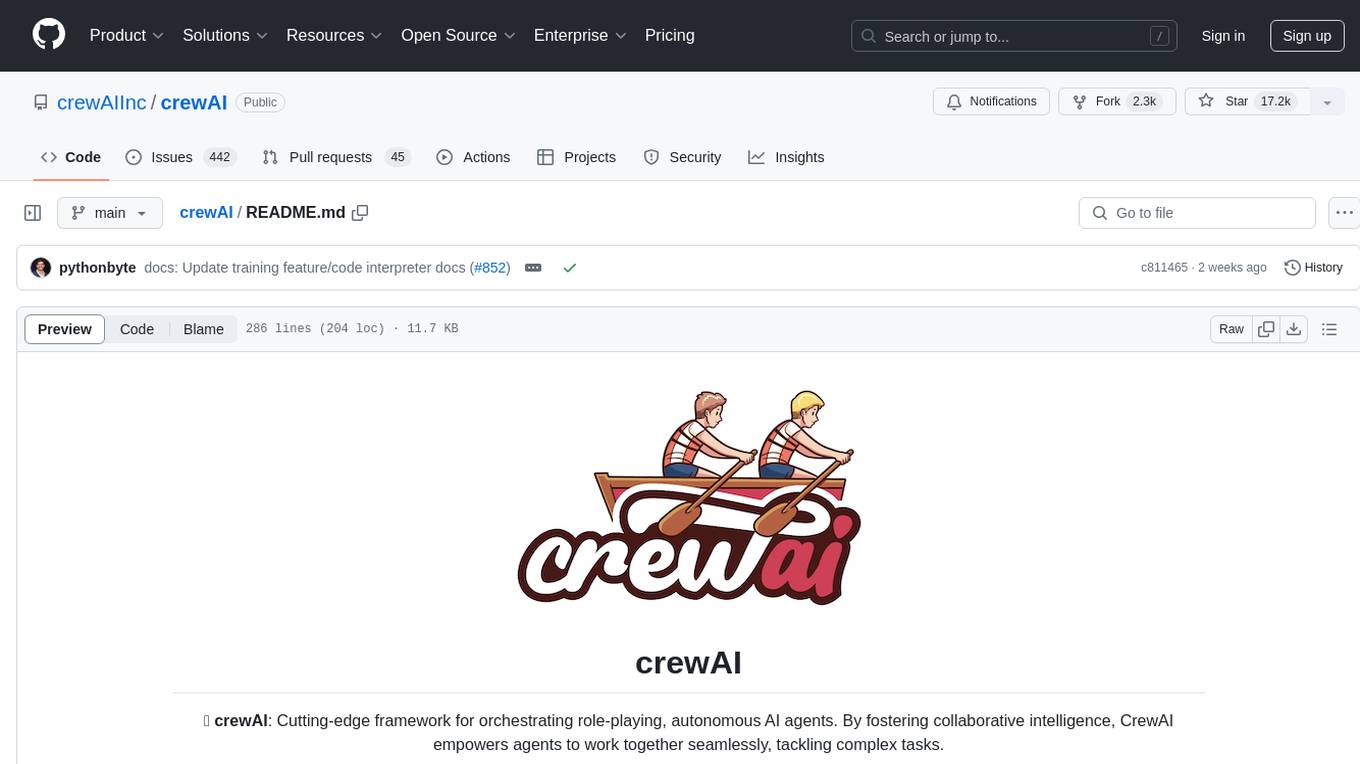
crewAI
CrewAI is a cutting-edge framework designed to orchestrate role-playing autonomous AI agents. By fostering collaborative intelligence, CrewAI empowers agents to work together seamlessly, tackling complex tasks. It enables AI agents to assume roles, share goals, and operate in a cohesive unit, much like a well-oiled crew. Whether you're building a smart assistant platform, an automated customer service ensemble, or a multi-agent research team, CrewAI provides the backbone for sophisticated multi-agent interactions. With features like role-based agent design, autonomous inter-agent delegation, flexible task management, and support for various LLMs, CrewAI offers a dynamic and adaptable solution for both development and production workflows.
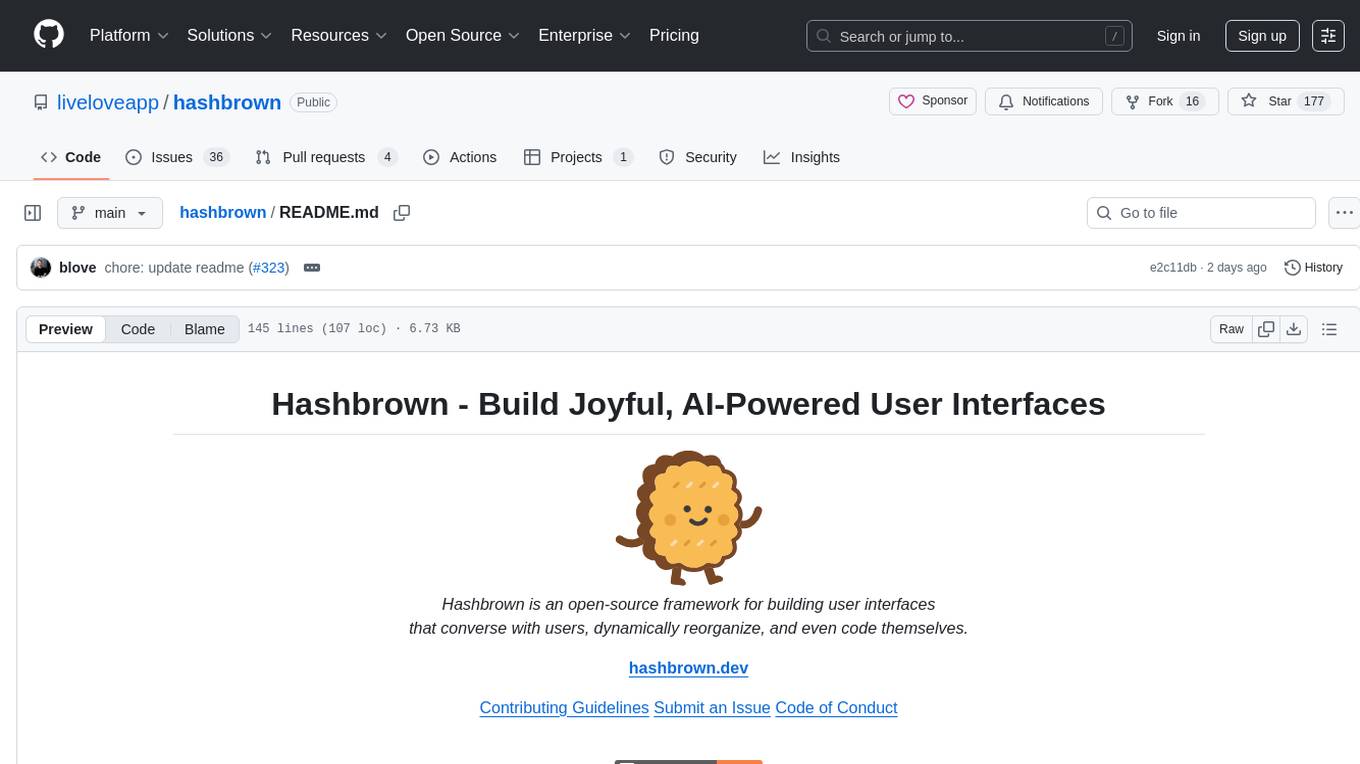
hashbrown
Hashbrown is a lightweight and efficient hashing library for Python, designed to provide easy-to-use cryptographic hashing functions for secure data storage and transmission. It supports a variety of hashing algorithms, including MD5, SHA-1, SHA-256, and SHA-512, allowing users to generate hash values for strings, files, and other data types. With Hashbrown, developers can quickly implement data integrity checks, password hashing, digital signatures, and other security features in their Python applications.
For similar tasks

pathway
Pathway is a Python data processing framework for analytics and AI pipelines over data streams. It's the ideal solution for real-time processing use cases like streaming ETL or RAG pipelines for unstructured data. Pathway comes with an **easy-to-use Python API** , allowing you to seamlessly integrate your favorite Python ML libraries. Pathway code is versatile and robust: **you can use it in both development and production environments, handling both batch and streaming data effectively**. The same code can be used for local development, CI/CD tests, running batch jobs, handling stream replays, and processing data streams. Pathway is powered by a **scalable Rust engine** based on Differential Dataflow and performs incremental computation. Your Pathway code, despite being written in Python, is run by the Rust engine, enabling multithreading, multiprocessing, and distributed computations. All the pipeline is kept in memory and can be easily deployed with **Docker and Kubernetes**. You can install Pathway with pip: `pip install -U pathway` For any questions, you will find the community and team behind the project on Discord.
For similar jobs

lollms-webui
LoLLMs WebUI (Lord of Large Language Multimodal Systems: One tool to rule them all) is a user-friendly interface to access and utilize various LLM (Large Language Models) and other AI models for a wide range of tasks. With over 500 AI expert conditionings across diverse domains and more than 2500 fine tuned models over multiple domains, LoLLMs WebUI provides an immediate resource for any problem, from car repair to coding assistance, legal matters, medical diagnosis, entertainment, and more. The easy-to-use UI with light and dark mode options, integration with GitHub repository, support for different personalities, and features like thumb up/down rating, copy, edit, and remove messages, local database storage, search, export, and delete multiple discussions, make LoLLMs WebUI a powerful and versatile tool.

Azure-Analytics-and-AI-Engagement
The Azure-Analytics-and-AI-Engagement repository provides packaged Industry Scenario DREAM Demos with ARM templates (Containing a demo web application, Power BI reports, Synapse resources, AML Notebooks etc.) that can be deployed in a customer’s subscription using the CAPE tool within a matter of few hours. Partners can also deploy DREAM Demos in their own subscriptions using DPoC.

minio
MinIO is a High Performance Object Storage released under GNU Affero General Public License v3.0. It is API compatible with Amazon S3 cloud storage service. Use MinIO to build high performance infrastructure for machine learning, analytics and application data workloads.

mage-ai
Mage is an open-source data pipeline tool for transforming and integrating data. It offers an easy developer experience, engineering best practices built-in, and data as a first-class citizen. Mage makes it easy to build, preview, and launch data pipelines, and provides observability and scaling capabilities. It supports data integrations, streaming pipelines, and dbt integration.

AiTreasureBox
AiTreasureBox is a versatile AI tool that provides a collection of pre-trained models and algorithms for various machine learning tasks. It simplifies the process of implementing AI solutions by offering ready-to-use components that can be easily integrated into projects. With AiTreasureBox, users can quickly prototype and deploy AI applications without the need for extensive knowledge in machine learning or deep learning. The tool covers a wide range of tasks such as image classification, text generation, sentiment analysis, object detection, and more. It is designed to be user-friendly and accessible to both beginners and experienced developers, making AI development more efficient and accessible to a wider audience.

tidb
TiDB is an open-source distributed SQL database that supports Hybrid Transactional and Analytical Processing (HTAP) workloads. It is MySQL compatible and features horizontal scalability, strong consistency, and high availability.

airbyte
Airbyte is an open-source data integration platform that makes it easy to move data from any source to any destination. With Airbyte, you can build and manage data pipelines without writing any code. Airbyte provides a library of pre-built connectors that make it easy to connect to popular data sources and destinations. You can also create your own connectors using Airbyte's no-code Connector Builder or low-code CDK. Airbyte is used by data engineers and analysts at companies of all sizes to build and manage their data pipelines.

labelbox-python
Labelbox is a data-centric AI platform for enterprises to develop, optimize, and use AI to solve problems and power new products and services. Enterprises use Labelbox to curate data, generate high-quality human feedback data for computer vision and LLMs, evaluate model performance, and automate tasks by combining AI and human-centric workflows. The academic & research community uses Labelbox for cutting-edge AI research.

